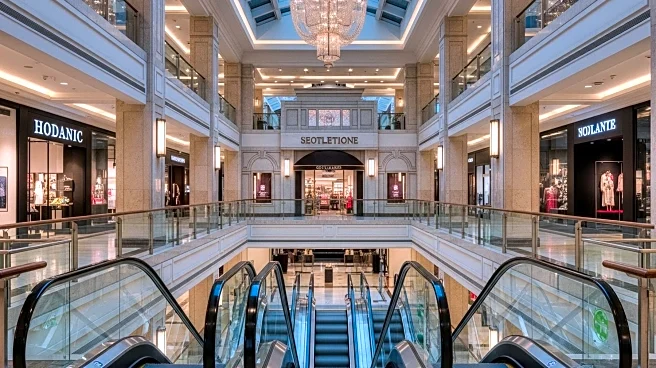What's Happening?
Dillard's, a regional department store chain, has partnered with Trademark Property Co. to invest in the Longview Mall in Texas. This strategic move involves upgrading the mall's property and tenant roster, potentially reinventing the traditional anchored-mall model. Analysts suggest that Dillard's could expand this approach to other centers, depending on the success of the Texas project. Bryn Feller from Northmarq views this as a real-time development rather than a pre-established strategy, highlighting its potential brilliance. Historically, department stores like Macy's and Sears have owned malls, but Dillard's investment reflects a modern incentive to have a stake in mall improvements and profits.
Why It's Important?
This investment by Dillard's signifies a shift in the retail landscape, where department stores are taking proactive roles in mall management to ensure their survival and profitability. As the department store sector faces challenges, Dillard's move could set a precedent for other retailers to follow, potentially revitalizing struggling malls. By investing in mall properties, Dillard's aims to enhance the shopping experience and drive traffic, benefiting both the anchor store and smaller in-line stores. This strategy could lead to a new profit stream for Dillard's and contribute to the evolution of the mall model, distinguishing thriving malls from those that may fail.
What's Next?
If successful, Dillard's may consider investing in more malls, transforming them into vibrant retail hubs. This could encourage other department stores to adopt similar strategies, fostering collaboration between mall developers and anchor stores. The Longview Mall project will serve as a case study, influencing future decisions in the retail sector. Analysts are watching closely to see if Dillard's approach will lead to a broader trend of department stores taking ownership stakes in malls.
Beyond the Headlines
Dillard's investment highlights the interconnected nature of mall ecosystems, where the performance of in-line stores impacts anchor stores. This move reflects a broader understanding that department stores cannot thrive in isolation. By taking an active role in mall management, Dillard's is addressing the challenges faced by American malls, potentially leading to a more sustainable retail environment. This strategy also underscores the importance of regional operators like Dillard's, which maintain strong community ties and offer unique shopping experiences.








